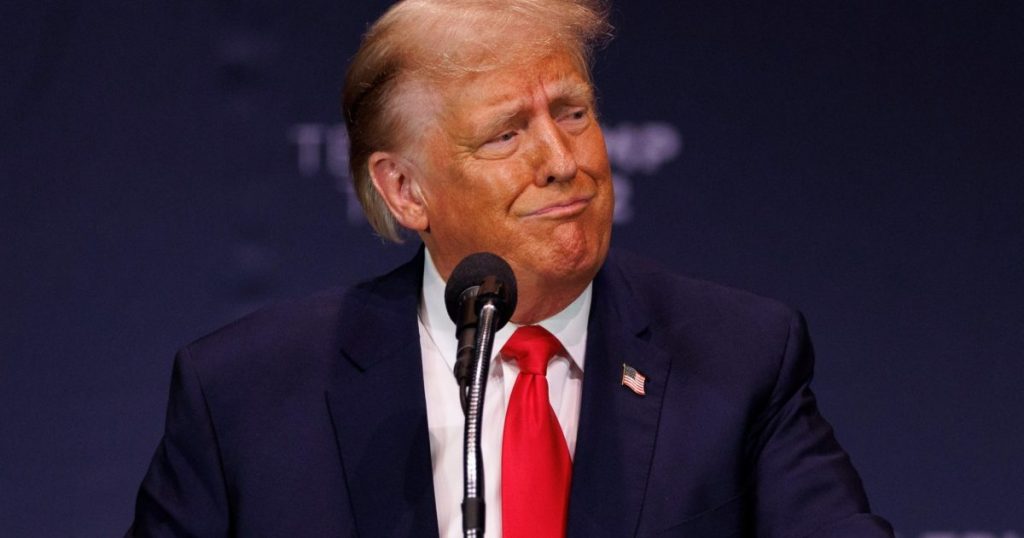Trump Campaign Defends Nazi-Era “Vermin” Threat With…Another Incendiary Threat
At a Veterans Day rally, Trump called his opponents “vermin”–a term scholars say harkens back to the dark history of the Nazis’ genocidal campaign against Jewish people.Cj Gunther/EFE via ZUMA Press
Fight disinformation: Sign up for the free Mother Jones Daily newsletter and follow the news that matters.Donald Trump is once again comparing his political enemies to animals on the campaign trail—and scholars are sounding the alarm about the fascist roots of his rhetoric.
At a Veterans Day rally in Claremont, New Hampshire on Saturday, Trump used the word “vermin” to refer to the left, pledging to take down his perceived political enemies if he wins a second term as president. As experts are pointing out, the same word was historically weaponized by dictators—including Adolf Hitler—as a tool of dehumanization.
Here’s Trump’s full quote (which starts at 1:47:30 in the C-SPAN video):
In honor of our great veterans on Veterans’ Day, we pledge to you that we will root out the communists, Marxists, fascists and the radical left thugs that live like vermin within the confines of our country, that lie and steal and cheat on elections, and will do anything possible—they’ll do anything—whether legally or illegally, to destroy America, and to destroy the American dream.
He also posted the same message on Truth Social.
Trump campaign spokesperson Steven Cheung pushed back on those condemning the former president’s choice of “vermin” to attack his opponents, telling the Washington Post that critics “who try to make that ridiculous assertion are clearly snowflakes grasping for anything because they are suffering from Trump Derangement Syndrome and their entire existence will be crushed when President Trump returns to the White House.” (Cheung later clarified to the Post that he meant to say their “sad, miserable existence” instead of their “entire existence.”)
This isn’t the first time Trump has dehumanized people with such incendiary language. He has called undocumented immigrants “animals,” and former White House aide Omarosa Manigault Newman a “dog,” just by way of a couple of examples. But Trump’s use of the word “vermin” over the weekend harkens back to a specific and dark period of history. As Ruth Ben-Ghiat, a New York University historian who studies fascism, authoritarianism, and propaganda, pointed out to the Washington Post, “calling people ‘vermin’ was used effectively by Hitler and Mussolini to dehumanize people and encourage their followers to engage in violence.”
Nazi propaganda also often portrayed Jewish people and political opponents as “vermin, parasites, or diseases,” according to research compiled by the U.S. Holocaust Memorial Museum. Furthermore, research has established dehumanization—specifically, equating members of the targeted group with animals or disease—as a key step in the process that leads to genocide.
Brian Klaas, a political scientist at University College London, said on MSNBC’s “Morning Joe” on Monday morning that Trump’s rhetoric signals a dark future: “I study the breakdown of democracy, and I don’t know how to say this more clearly: We are sleepwalking towards authoritarianism, and people are not waking up to this,” he said.
“I study the breakdown of democracy, and I don’t know how to say this more clearly: We are sleepwalking towards authoritarianism.” —@brianklaas pic.twitter.com/1ke6Uyw8Zz
— Morning Joe (@Morning_Joe) November 13, 2023
The list of experts condemning Trump’s remarks continued: Presidential biographer and historian Jon Meacham told “Morning Joe” hosts that “to call your opponents vermin and to dehumanize them is to not only open the door but to walk through the door toward the most ghastly kinds of crimes.” Yale philosopher Jason Stanley, who studies fascism and propaganda, told MSNBC’s Mehdi Hasan that Trump’s commentary “doesn’t echo ‘Mein Kamph,’ this is textbook ‘Mein Kampf,’” referring to Hitler’s autobiographical manifesto.
“Labeling your political opponents ‘vermin’—yeah, the Nazis targeted their political opponents, they targeted for incarceration in concentration camps, they targeted suspected communists, socialists, as internal enemies,” Stanley added.
Trump’s commentary comes at a time when antisemitism has been on the rise in the US, particularly in light of the ongoing Israel-Hamas war. But Trump’s acolytes are largely refusing to condemn him, instead doubling down or glossing over his troubling language.
When Kristen Welker, host of NBC’s “Meet the Press,” asked Republican National Committee Chair Ronna McDaniel on Sunday if she was “comfortable with this language coming from the GOP frontrunner,” McDaniel did not condemn his rhetoric, saying instead that she was “not going to comment on candidates and their campaign messaging.”
But, as Welker pointed out, Trump is, at this point, likely to be the Republican presidential nominee. A New York Times/Siena poll published last week showed Trump leading Biden in five out of six key battleground states.





